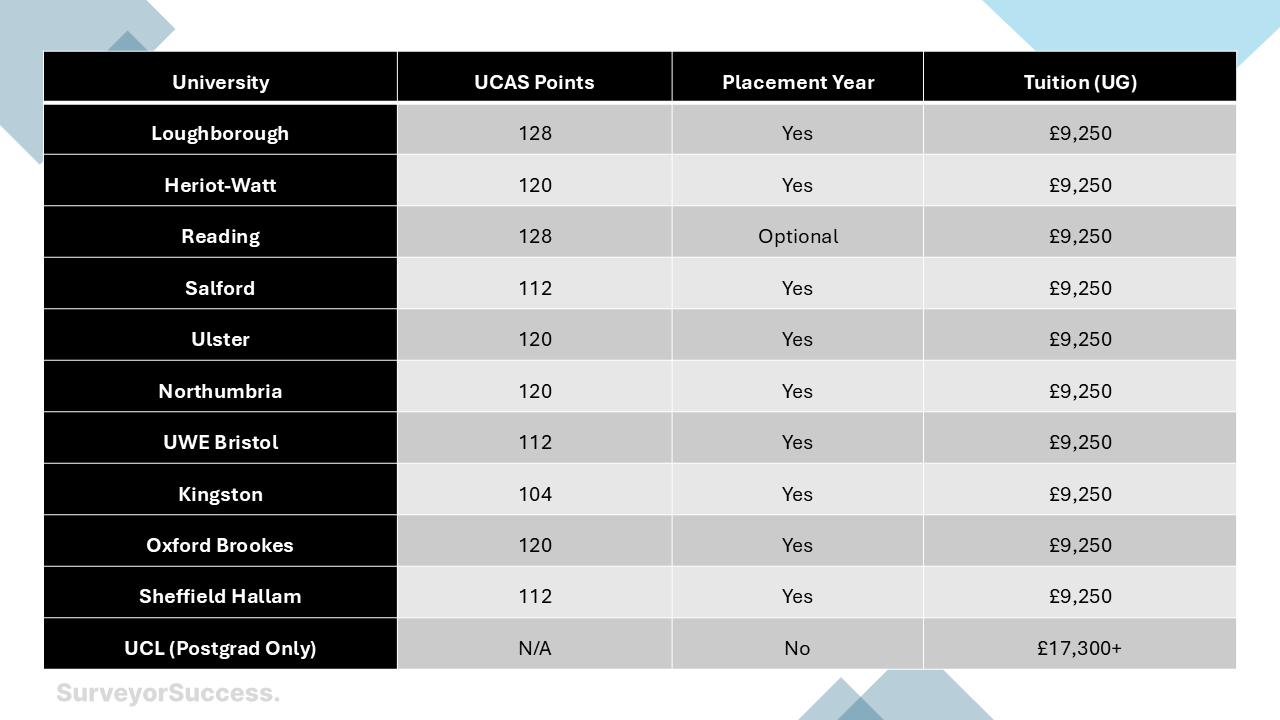July 25, 2025
10 mins read
Get weekly updates with our Newsletter
Regular updates ensure that readers have access to fresh perspectives, making Poster a must-read.
Courage Oseghale
July 25, 2025
10 mins read

Are you looking to build a successful career in quantity surveying? Your journey begins with the right education. Quantity surveying blends commercial acumen with technical expertise, making it a key role in the UK’s ever-growing construction sector. But with dozens of universities offering QS degrees, how do you choose the best?
This guide covers the 11 best UK universities for aspiring quantity surveyors, highlighting each institution's unique strengths, placement opportunities, employer partnerships, and—critically—their entry requirements, including UCAS points.
Whether you’re applying through UCAS or considering a postgraduate shift, this comprehensive guide will help you make a well-informed decision.
To qualify as a Chartered Quantity Surveyor, your degree must be accredited by the Royal Institution of Chartered Surveyors (RICS). Many top universities also hold CIOB (Chartered Institute of Building) recognition. This accreditation fast-tracks your eligibility for the Assessment of Professional Competence (APC)—the final step to becoming chartered.
Universities with strong employer links offer placement years, live project work, and networking with top firms like Mace, Turner & Townsend, Faithful+Gould, and Laing O’Rourke. Choosing a university embedded in industry connections can significantly boost your job prospects.

Course: BSc (Hons) Commercial Management and Quantity Surveying
Accreditation: RICS, CIOB
Regularly ranked in the UK’s top 10 for built environment disciplines, Loughborough combines academic rigour with an optional paid placement year, state-of-the-art facilities, and high employer engagement.
Entry Requirements:

Course: BSc (Hons) Quantity Surveying
Accreditation: RICS, CIOB
This Edinburgh-based university delivers an international experience with campuses in Dubai and Malaysia. The QS programme includes BIM integration, sustainable construction, and a forward-thinking approach to project delivery.
Entry Requirements:

Course: BSc (Hons) Quantity Surveying
Accreditation: RICS, CIOB
Reading School of the Built Environment is globally recognised. The course offers a balance between technical depth and practical exposure, with options for international study and industry placements.
Entry Requirements:

Course: BSc (Hons) Quantity Surveying
Accreditation: RICS
Salford stands out for its close ties to Manchester’s booming construction sector and offers a digitally focused QS degree, including training in BIM and 5D cost modelling. It also boasts one of the UK's most advanced built environment research centres.
Entry Requirements:

Course: BSc (Hons) Quantity Surveying and Commercial Management
Accreditation: RICS
A strong choice for Northern Ireland-based students, Ulster’s QS programme focuses on cost consultancy, procurement law, and risk management. Graduate satisfaction and employability rates are among the highest in the UK.
Entry Requirements:

Course: BSc (Hons) Quantity Surveying
Accreditation: RICS
A practical and industry-aligned course, Northumbria emphasises digital construction, contract administration, and professional development. Strong placement links exist with Northern Powerhouse infrastructure projects.
Entry Requirements:
.webp)
Course: BSc (Hons) Quantity Surveying and Commercial Management
Accreditation: RICS, CIOB
This course integrates real-world project work, construction economics, and digital quantity surveying tools. Based in Bristol, UWE has great links with South West construction employers.
Entry Requirements:

Course: BSc (Hons) Quantity Surveying Consultancy
Accreditation: RICS
Perfectly located for students wanting to work in London, Kingston’s course blends sustainability, urban regeneration, and commercial consultancy. Guest lectures and live projects are standard.
Entry Requirements:

Course: BSc (Hons) Quantity Surveying and Commercial Management
Accreditation: RICS
With a global alumni network and a modern campus, Brookes’ course offers international perspectives, optional study abroad, and excellent digital learning tools.
Entry Requirements:

Course: BSc (Hons) Quantity Surveying
Accreditation: RICS
A career-focused university, SHU offers hands-on training, a year-long work placement, and modules in construction law, risk control, and sustainable project management.
Entry Requirements:
.jpg)
Course: MSc Construction Economics and Management
Accreditation: RICS
Targeted at postgraduates, UCL’s elite programme attracts professionals with backgrounds in construction or finance. The course focuses on infrastructure finance, project strategy, and international development.
Entry Requirements (Postgraduate):

When choosing a quantity surveying degree, it’s important to go beyond university rankings. Look for programmes accredited by the Royal Institution of Chartered Surveyors (RICS) — this ensures the course aligns with industry standards and paves the way for chartered status (MRICS). Accreditation is often a requirement for graduate jobs with top employers.
Next, consider whether the course offers a placement or sandwich year. Real-world industry experience not only enhances your CV but also helps you build valuable connections that can lead to graduate roles. Universities with strong industry links, like Salford or Loughborough, often facilitate internships with Tier 1 contractors or consultancies.
Entry requirements are also worth noting. Some universities offer foundation years or flexible routes for students without traditional A-levels. Finally, look at the module content—does the course cover contract law, cost planning, BIM, and sustainability?
Good quantity surveying programmes blend technical knowledge, practical skills, and professional development, preparing you for roles in infrastructure, commercial development, or consultancy. If the course also supports CIOB, RIBA, or ICES routes, that’s a bonus for cross-disciplinary opportunities.
Quantity surveying is a rewarding career that combines financial acumen, legal knowledge, and project management—all within the fast-paced world of construction and infrastructure. If you're analytical, detail-oriented, and enjoy working with both numbers and people, quantity surveying offers a dynamic and varied career path.
The profession plays a vital role in the entire project lifecycle, from initial feasibility and cost planning to final account settlements. Whether you work on housing, commercial buildings, highways, or renewable energy projects, your expertise helps clients stay on budget and in control.
There’s strong demand for qualified quantity surveyors in the UK and globally, especially with the government’s focus on major infrastructure investment. With a RICS-accredited degree, graduates can quickly progress toward chartered surveyor status (MRICS), unlocking higher salaries and leadership roles.
Quantity surveyors earn competitive starting salaries (typically £28,000–£35,000) and can earn over £60,000+ with experience or as freelancers. It’s also one of the few professions where you can shift between contracting, consultancy, client-side, or self-employment with ease.
If you’re looking for job security, career progression, and the opportunity to shape the built environment, quantity surveying is a smart, future-proof choice.
A master’s degree in quantity surveying is not strictly necessary to enter the profession, but in some cases, it can be a strategic career accelerator. For school leavers, the traditional route is through an undergraduate BSc (Hons) Quantity Surveying degree from a RICS-accredited university. This is sufficient to secure entry-level roles and begin working toward chartered status (MRICS).
However, if your undergraduate degree is in a non-cognate subject (e.g., economics, architecture, engineering), a postgraduate conversion MSc in Quantity Surveying provides a valuable gateway into the profession. These programmes are often available with part-time or distance learning options, making them suitable for career changers or working professionals.
For those already holding a relevant BSc degree, a master’s can offer deeper knowledge in specialised areas such as project finance, international construction law, or BIM. While not essential for chartership, it may enhance your employability or accelerate promotion into senior or commercial management roles.
Ultimately, whether a master’s is necessary depends on your background, career goals, and whether you seek to differentiate yourself in a competitive job market. For many, a strong BSc degree plus practical experience is enough to thrive in the field, especially with the support of RICS-accredited training and mentoring.
Finding the right university is key to launching a successful career in quantity surveying. With the profession in high demand across the UK, each of these 11 universities offers a RICS-accredited path that leads to real-world skills, strong employer links, and a fast track to becoming a Chartered Quantity Surveyor.
Whether you're drawn to the academic prestige of UCL or the hands-on approach at Salford or Northumbria, make sure to weigh up each option based on UCAS points, placement year availability, location, and employer connections.
Regular updates ensure that readers have access to fresh perspectives, making Poster a must-read.
©SurveyorSuccess. All rights reserved.